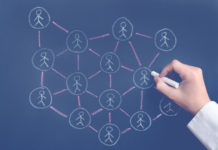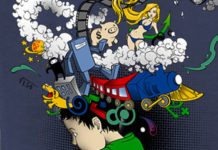Transcranial Magnetic Stimulation
TMS is a psychiatric treatment that uses a rapidly alternating magnetic field to induce electric currents in the brain. These currents stimulate neurons, causing them to "fire." When used repetitively, TMS is said to alter the excitability of the brain area that has been stimulated. In the psychiatric field, TMS is being used increasingly as a treatment for depression, particularly with so-called treatment-resistant clients. I Googled the string "TMS + depression" and got 1.35 million hits. So the idea is attracting attention.
Helping Children to Overcome OCD: 6 Creative Strategies for Parents
Here, Dr. Ben Furman offers a creative approach to helping children who struggle with OCD. Explaining why behaviors like reasoning, reassuring, and superstitious rituals don’t work, he suggests engaging alternatives that teach kids how to manage their “worry monster” and make sense of their distressing experience.
US Government Reviews Antidepressants During and After Pregnancy
The U.S. Department of Health and Human Services’ Agency for Healthcare Research and Quality has released a meta-analysis “Evidence Report” of the studies into...
“Baby Cry Too Much?”
This is the second in my new series, “Haiku for social change”, the first having appeared on my own blog page. Since this piece is about pharmacology and psychopharmacology, I think MIA is a good home for it.
The Strange, Contagious History of Bulimia
In this piece for Science of Us, Lee Daniel Kravetz discusses the impact of media exposure on the rise of bulimia and explores the social...
A Feminist Neuroethics of Mental Health
From The Neuroethics Blog: When populations are divided into two genders, women show roughly double the incidence of depression, anxiety, and stress-related mental health concerns....
Many Teens Start Misusing Stimulants By Age 13
An equal percentage of young people will start misusing ADHD-related and other stimulant drugs for the first time at age 13 as will start at age 20.
Living Alone Nearly Doubles Antidepressant Use
Finnish researchers found that in a study of 3471 men and women, those living alone were almost twice as likely to use an antidepressant....
Growing Evidence for the Link Between ADHD Diagnosis and Age at School Admission
Researchers detect a striking relationship between the month of school enrollment relative to peers and patterns of ADHD diagnoses in a large sample of elementary school students throughout the US.
Why Neuroscience Cannot Explain Madness
The decision by the National Institute of Mental Health to part company with the APA’s forthcoming DSM-5 should not be taken as evidence that biological psychiatry is entering a terminal decline. Far from it, as the Director of NIMH Thomas Insel’s blog of 29th April 2013 makes clear, the reason NIMH has opted for its own Research Diagnostic Criteria (RDoC) is because they believe psychiatric patients deserve something better.
Mental Imagery, Pain and Healing
-Mental "imagery" plays a role in psychological suffering prompted by vivid memories, and also in healing modalities such as creative visualization.
The Myth of Mental Illness Revisited, NIMH Style
When Thomas Szasz’s name comes up in debates over defining mental illness, it is fairly common to hear people say something along the lines of, “Well, he made some good points, but he was just too extreme.” Yet I am struck by how conversations about DSM-5, being released this month, make the crisp arguments Szasz consistently offered for 50 years just as timely as ever. I’d even go so far as to suggest that a large number of counselors, psychologists, social workers, and psychiatrists pretty much agree with the main tenets of Szasz’s argument, despite their ongoing disclaimers.
Anxiety Accounts for Bipolar False Positives
Researchers found that of 1,534 patients assessed at Australia's Black Dog Institute Depression clinic, a significant number received a false positive diagnosis of bipolar...
A Likely Culprit for Teen Mental Health Deterioration
From The Conversation: In the five years between 2010 and 2015, U.S. teens' mental health greatly deteriorated. The sudden ascendance of the smartphone is most...
Exploring Alternate Pathways to Voice-Hearing
Authors propose various pathways to the phenomena of voice-hearing in clinical and nonclinical populations.
U-M Team Concludes Bipolar Disorder Has Many Causes
From Science Magazine: After studying over 1,100 individuals diagnosed with bipolar disorder for 12 years, a University of Michigan research team has found that no...
“Cannabis for Schizophrenia – Does it Work?”
The German news agency DW features a video report on whether cannabidiol, an active substance derived from marijuana, can help relieve the symptoms of schizophrenia.
Ketamine is Coming
-NPR interviews some of the psychiatrists who feel that the fast-acting drug ketamine is a "revolution" in depression treatment.
Fear in Infants Predicts Guilt in Toddlers, Later Psychopathology
Researchers at Cardiff University in Wales find that fear in infants is a predictor of guilt in later life, and write in Development and...
NARPA Reflections: The Necessity of Disability
I think it is time to reclaim the word disability. Disability needs to be appreciated. To the extent we value community over isolation, anything anyone cannot do, or needs help with, builds community. There are infinite examples in every career and walk of life of how necessary “disability” (since we're calling it that) is for connection, service and meaning in life. Without it we'd have absolutely no need for each other. And the fastest way to despair is to feel unnecessary.
Individualism a Risk Factor for Depression
Findings from a survey of 6,082 individuals, designed to explore racial and ethnic differences in mental disorders, reinforce the relationship between social support and...
“More Patients in Scotland Given Antidepressants”
The BBC reports that the number of people in Scotland taking antidepressants has increased by 5% in the past year with most of the patients being women and those in the poorest parts of the country. “We are now looking at the flabbergasting statistic of more than one in seven people in Scotland being prescribed antidepressants this year,” Conservative health spokesman Jackson Carlaw said. “We urgently have to look at better alternatives than simply parking people on medication in the hope things don't get any worse, with no aspiration for complete recovery."
School-Based Program for Anxiety and Depression Shows Promise
Researchers evaluate the impact of a school-based prevention program on anxious and depressive symptoms.
“Study Links Mobile Device Addiction to Depression and Anxiety”
A study published in the journal Computers in Human Behavior found that addictions to mobile devices are linked to anxiety and depression in college students....
A Glimpse Inside US Mental Health Detention Centre
From The Sun: New York photographer Lili Holzer-Glier was recently allowed inside the Cook County Department of Corrections in Chicago, where 35 percent of inmates...


















